The Witcher 3: Wild Hunt – Preview
by Edward
|
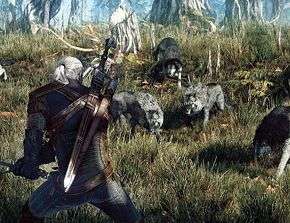 There’s an untold power to the written word, and for Andrzej Sapkowski and his novel The Last Wish, it was one that would inspire one of the most critically-acclaimed series of RPGs around. Since first being published, his works have helped spawn the Witcher series, following one Geralt of Rivia and his adventures through a world of supernatural occurrences, grey and grey morality and complex, intricately written characters. Taking the role-playing world by storm, CD Projekt RED’s take on the novels has slowly become one of the genre’s leading blockbusters, and so it should come as no surprise that their next-gen epic is turning so many heads, as it promises to entice with an open-world and around one-hundred hours of quests to plough through. Gather your potions and steady your mount… it’s time to hunt.
There’s an untold power to the written word, and for Andrzej Sapkowski and his novel The Last Wish, it was one that would inspire one of the most critically-acclaimed series of RPGs around. Since first being published, his works have helped spawn the Witcher series, following one Geralt of Rivia and his adventures through a world of supernatural occurrences, grey and grey morality and complex, intricately written characters. Taking the role-playing world by storm, CD Projekt RED’s take on the novels has slowly become one of the genre’s leading blockbusters, and so it should come as no surprise that their next-gen epic is turning so many heads, as it promises to entice with an open-world and around one-hundred hours of quests to plough through. Gather your potions and steady your mount… it’s time to hunt.
Aiming to deliver a more personal story than with previous instalments, Wild Hunt is set some time after the events of The Witcher 2, although anyone new to the series needn’t worry as you don’t have to have played either of the preceding chapters in order to understand what’s going on this time around. Geralt has moved on to pastures new, but these lands are being plagued by mystical creatures that form the titular Wild Hunt, and the demo begins as our hero searches for a survivor of their attacks.
Even in a pre-alpha state, the amount of detail is absolutely incredible, and if you’re not a PC gamer then it’s one of the few titles showcased at E3 that really demonstrate the power of the next console generation. If you are a PC gamer, you’d do well to make sure your rig is suitably beefed up, because I’m fairly confident in the power of my own computer, and I’m relatively certain it’s going to quiver in its boots at the prospect of having to run this beast. Everything presented was absolutely jaw-dropping in scope, with tiny intricacies pouring out of every single moment; at one point in the demo Geralt was asked to stay and dine with one of his many acquaintances, and the man was adorned with a fur-skin on his shoulders that had every hair individually animated and reacting to the wind around it. Despite it being nothing more than a fleeting conversation with someone before swiftly moving on, and being so early into the development process, that one moment was packed with more visual flair than most titles can muster throughout all their CGI cut-scenes – an even more impressive achievement when you consider that everything in The Witcher 3 is handled in-game and in real-time.
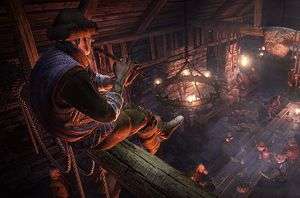 This attention and care is bursting out of every orifice that The Witcher 3 can muster, and when you consider that this is CD Projekt RED’s first foray into the open-world, it’s something truly wonderful to behold. The beautiful visuals seem almost effortless, and it becomes far more impressive when you take into account that such level of detail has been put into the lives of the people who live there, too. Not content to just make a world that looks real, the developers have done what they can to make one that feels real, too; villagers have their own routines and live their own lives, and you could feasibly sit and observe them for as long as you wanted.
This attention and care is bursting out of every orifice that The Witcher 3 can muster, and when you consider that this is CD Projekt RED’s first foray into the open-world, it’s something truly wonderful to behold. The beautiful visuals seem almost effortless, and it becomes far more impressive when you take into account that such level of detail has been put into the lives of the people who live there, too. Not content to just make a world that looks real, the developers have done what they can to make one that feels real, too; villagers have their own routines and live their own lives, and you could feasibly sit and observe them for as long as you wanted.
If you’re not satisfied with that, Wild Hunt also boasts around one-hundred hours of main story missions and side-quests, with the intention to blend them as seamlessly into the world as possible, and one of the ways they’re doing this is by eliminating the quest-markers scattered around the world and letting the player uncover the content organically. That’s not all; throughout Geralt’s adventures he’ll also be able to engage in additional self-contained random encounters that don’t interfere with the main plot, and which can appear at any time, just to add more depth to an already-elaborate open-world. Players can choose to engage themselves as much or as little as they want to outside of the storyline, although their involvement will no-doubt contribute to their ending, as Wild Hunt contains thirty-six possible outcomes from all of your endeavours – referred to as the State of the World – and conceivably means that you and all of your friends could come out at the other side and end up with a wholly different experience to the rest.
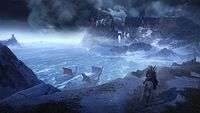 |
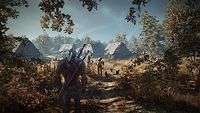 |
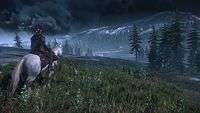 |
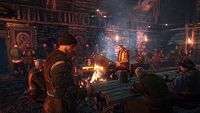 |
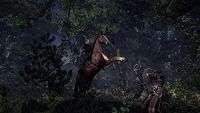 |
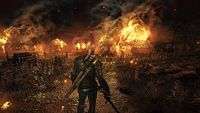 |
Traversal throughout the land can be done in many a different manner, with walking, fast-travelling, horse-back and boats all available as methods of transportation to Geralt of Rivia, and – in a move rivalling that of Assassin’s Creed IV – you could easily travel from one side of the map to the other without ever coming across a loading screen. The boats are a particularly fascinating addition as, while they’re the only way that Geralt can travel between some of the vast islands that construct this world, it’s entirely possible for them to be destroyed mid-voyage, putting an early stopper on the life of our titular Witcher, a man who for all of his cunning and battle prowess lacks the ability to swim. To avoid drowning in the murky depths, it’s advised to stay out of the sea when the skies are stormy as, due to the new dynamic weather system, your fortunes could see a sudden reversal and you could find yourself dashed upon the rocks as a result.
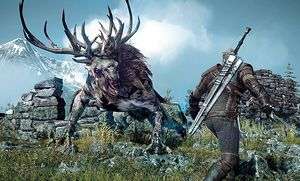 A greater focus on the skies also means that some villagers won’t go outside when it’s raining too heavily, and some monsters and creatures will only appear during certain meteorological states. Some of these fiends are even strengthened by certain conditions, with the example cited being that if Geralt should come across a werewolf on the night of a full moon, he’d be squaring off against its strongest possible form. If you can’t wait for the skies to clear up naturally, you can always send the Witcher into a meditative state, allowing the hours to fly by until you’re ready to leap back into action.
A greater focus on the skies also means that some villagers won’t go outside when it’s raining too heavily, and some monsters and creatures will only appear during certain meteorological states. Some of these fiends are even strengthened by certain conditions, with the example cited being that if Geralt should come across a werewolf on the night of a full moon, he’d be squaring off against its strongest possible form. If you can’t wait for the skies to clear up naturally, you can always send the Witcher into a meditative state, allowing the hours to fly by until you’re ready to leap back into action.
The series’ revered morality system makes a welcome return and, if one of the side-quests we were given was any indication, it’s just as subtle and nuanced as ever. In the world of The Witcher, nothing is ever fully black and white, and any decisions you make could have repercussions throughout the rest of the story or pop back up again for a fleeting moment, and that you’re never quite sure how it’ll all end up is one of the reasons the writing is so loved. Lacking the time to show a more extreme example, CD Projekt RED instead opted to show us but a microcosm of what will be in Wild Hunt, as Geralt made his way to a village ravaged by several killings; the village elders believe it’s been caused by the forest spirits, yet our Witcher knows it to be the handiwork of a creature called a Leshen. The inhabitants won’t be safe until whomever the monster has chosen as its mark has disappeared and, despite protest, one villager is convinced that it’ll skedaddle once all of the elders have been disposed of.
Discovering that the Leshen’s chosen mark is the significant other of the boisterous villager, words must be chosen carefully, and although you can draw out the conversation longer and steer it in different directions, we were on a collision course with the truth. Once the bombshell had been dropped, the matter turned to what was to be done with her, and this is where that subtle nuance truly began to shine. After all, Geralt had originally said that the mark had to be removed, but he didn’t specify how that should be done. In essence, the moral choice literally depended on your own interpretation; should they sever the link by removing her from this mortal coil, or by banishing her elsewhere?
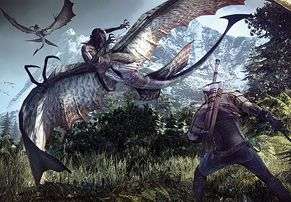 After the decision had been made, it was time to prepare and hunt down our Leshen. There are no boss encounters in Wild Hunt; some monsters are just bigger than others, and this was as perfect a time as any to check out how the combat system has changed since Assassin of Kings. One major change is that all of the moves at your disposal – swords, spells and dodges – can be linked together more fluently, making it easier to swap between them and make the ensuing fights more naturally-flowing as a result. Another comes from the magic menu no longer slowing the action to a crawl, allowing you to get a brief respite from all the carnage, and instead requires the player to think more efficiently.
After the decision had been made, it was time to prepare and hunt down our Leshen. There are no boss encounters in Wild Hunt; some monsters are just bigger than others, and this was as perfect a time as any to check out how the combat system has changed since Assassin of Kings. One major change is that all of the moves at your disposal – swords, spells and dodges – can be linked together more fluently, making it easier to swap between them and make the ensuing fights more naturally-flowing as a result. Another comes from the magic menu no longer slowing the action to a crawl, allowing you to get a brief respite from all the carnage, and instead requires the player to think more efficiently.
Already looking far improved from its predecessors, the battle was soon over, and although the Leshen had proven to be a worthy adversary, our Witcher had soon laid waste to his formidable foe, but – as we were about to discover – so had the villagers to their elders. Led by the same bespoke leader as before, he bragged of their victory over the Leshen and his conspirators, with our Geralt choosing not to intervene or put the man in his place, and instead taking his agreed payment and moving on. Later in the story, it would transpire that our actions had inadvertently led to the inevitable downfall of that civilisation’s inhabitants as, without a true authoritarian system in place, anarchy began to reign and the settlement would prove to outlast the Leshen by a mere three months.
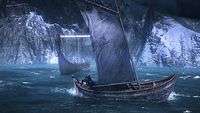 |
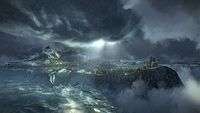 |
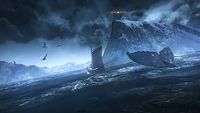 |
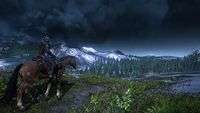 |
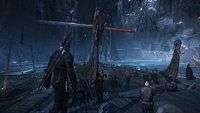 |
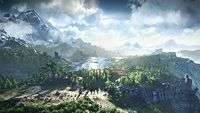 |
After just a tiny glimpse at what CD Projekt RED are creating it’s hard not to be impressed, thanks to an expansive world that promises to be bigger and filled with more content than Skyrim, one-hundred hours of original quests, additional random occurrences throughout the world, and a finely-detailed script that can change the outcome of entire events through nothing more than the tone of a single sentence. For all the promises of revolutionary new experiences that could only come with a new console cycle, The Witcher 3 was one of the only times that I truly believed it.
The Witcher 3: Wild Hunt isn’t a tease of the next-gen, it is the next-gen.
Last five articles by Edward
- Best of 2015: Journey's End: A New Beginning
- Journey's End: A New Beginning
- You Can't Choose Your Happy Ending
- Okay, Let's Fix Comedy In Games - The V-Effekt
- Time Keeps On Smashing Away

















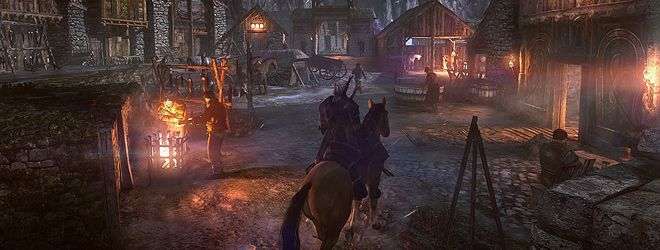
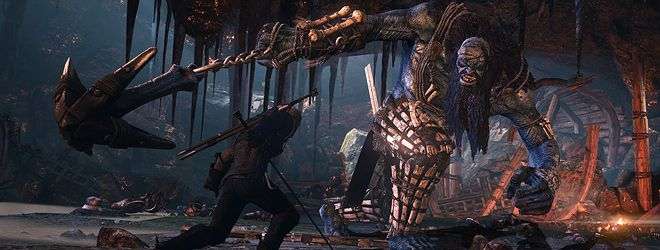





The Last Wish is not a novel, it’s a collection of short stories. And the entire series consists of two volumes of short stories and five novels, so it’s weird to only mention The Last Wish as inspiration for CDP RED.
I was aware that there was a whole series of Witcher books, but The Last Wish was the one that spawned the series proper and so in the interests of flow I chose to open with that; I thought that the first instalment of something would be what would inspire a series, I guess! Also, while it is a series of short stories my copy of it actually reads “The bestselling novel which inspired the cult videogame THE WITCHER“, so I chose to call it a novel as a result. I hope this helps explain everything, and thank you for reading